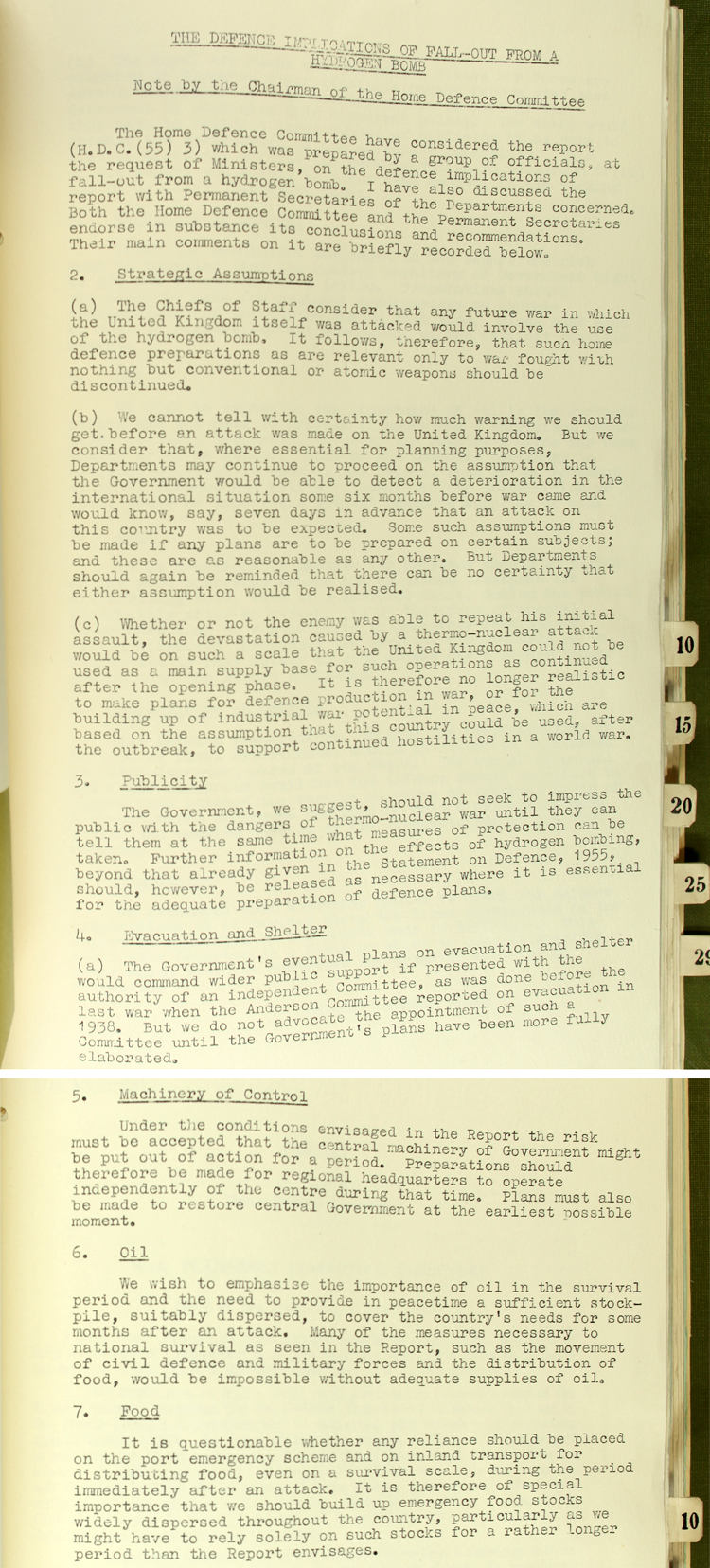Summary of comments on a report outlining the defence implications of a Hydrogen Bomb attack recorded by Norman Brook at the Cabinet Office, 25th March, 1955 (CAB 134/940)
Transcript
THE DEFENCE IMPLICATIONS OF FALL-OUT FROM A HYDROGEN BOMB
Note by the Chairman of the Home Defence Committee
The Home Defence Committee have considered the report (H.D.C.(55) 3) which was prepared by a group of officials, at the request of Ministers, on the defence implications of fall-out from the hydrogen bomb. I have also discussed the report with Permanent Secretaries of the Departments concerned. Both the Home Defence Committee and the Permanent Secretaries endorse in substance its conclusions and recommendations. Their main comments on it are briefly recorded below.
2. Strategic Assumptions
(a) The chiefs of Staff consider that any future war in which the United Kingdom itself was attacked would involve the use of the hydrogen bomb. It follows, therefore, that such home defence preparations as are relevant only to war fought with nothing but conventional or atomic weapons should be discontinued.
(b) We cannot tell with certainty how much warning we should get before an attack was made on the United Kingdom. But we consider that, where essential for planning purposes, Departments may continue to proceed on the assumption that the Government would be able to detect a deterioration in the international situation some six months before war came and would know, say, seven days in advance that an attack on this country was to be expected. Some such assumptions must be made if any plans are to be prepared on certain subjects; and these are as reasonable as any other. But Departments should again be reminded that there can be no certainty that their assumption would be realised.
(c) Whether or not the enemy was able to repeat his initial assault, the devastation caused by a thermo-nuclear attack would be on such a scale that the United Kingdom could not be used as a main supply base for such operations as continued after the opening phase. It is therefore no longer realistic to make plans for defence production in war, or for the building up of industrial war potential in peace, which are based on the assumption that this country could be used, after the outbreak, to support continued hostilities in world war.
3. Publicity
The Government, we suggest, should not seek to impress the public with the dangers of thermo-nuclear war until they can tell them at the same time what measures of protection can be taken. Further information on the effects of hydrogen bombing, beyond that already given in the Statement on Defence, 1955, should, however, be released as necessary where it is essential for the adequate preparation of defence plans.
4. Evacuation and Shelter
(a) The Government’s eventual plans on evacuation and shelter would command wider public support if presented with the authority of an independent Committee, as was done before the last war when the Anderson Committee reported on evacuation in 1938. But we do not advocate the appointment of such a Committee until the Government’s plans have been fully elaborated.
…
5. Machinery of Control
Under the conditions envisaged in the Report the risk must be accepted that the central machinery of Government might be put out of action for a period. Preparations should therefore be made for regional headquarters to operate independently of the centre during that time. Plans must also be made to restore central Government at the earliest possible moment.
6. Oil
We wish to emphasise the importance of oil in the survival period and the need to provide in peacetime a sufficient stockpile, suitably dispersed, to cover the country’s needs for some months after an attack. Many of the measures necessary to national survival as seen in the Report, such as the movement of civil defence and military forces and the distribution of food, would be impossible without adequate oil.
7. Food
It is questionable whether any reliance should be placed on the port emergency scheme and on inland transport for distributing food, even on a survival scale, during the period immediately after an attack. It is therefore of special importance that we should build up emergency food stocks widely dispersed throughout the country, particularly as we might have to rely solely on such stocks for a rather longer period than the Report envisages.
